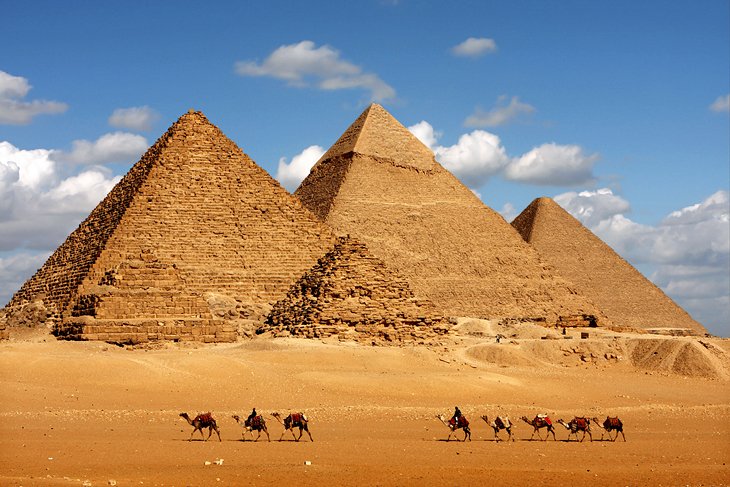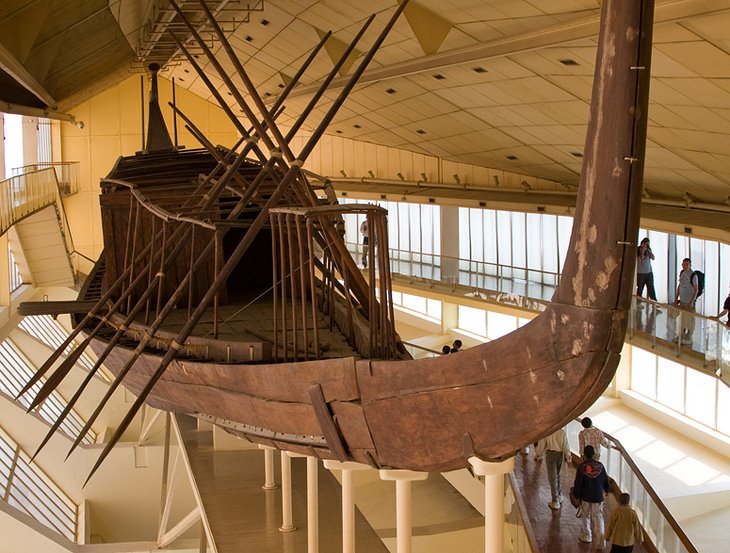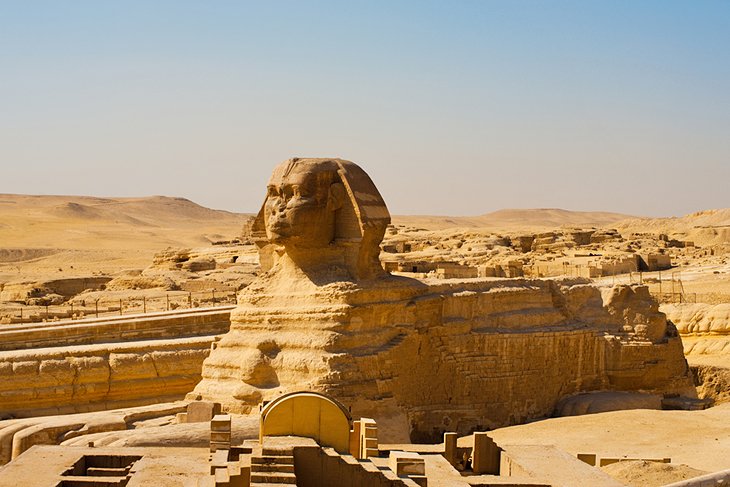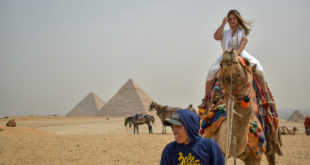Giza is one of the largest cities in Egypt. It is twenty kilometers North West of the capital city Cairo. It is the capital city of the Giza administrative section of Egypt west of the River Nile. The Giza area is found on the Giza Plateau where numerous artifacts and historical sites of Egypt lye as tourist attractions.
 Giza plateau has the major attractions of the world. If you were told to imagine a strong kingdom that existed thousands of years ago, you would think that it must be a fairy tale. Here at Giza, the tales of the ancient Egypt kingdom even in times of Moses is brought before your naked eyes. A major part of the Giza plateau is set aside to preserve the signs of the existence of the superiority of the Egyptian kingdom through ages. In the bare desert of the plateau are high stable pyramids that reflect the faces of the pharaohs buried within their respective pyramids.
Giza plateau has the major attractions of the world. If you were told to imagine a strong kingdom that existed thousands of years ago, you would think that it must be a fairy tale. Here at Giza, the tales of the ancient Egypt kingdom even in times of Moses is brought before your naked eyes. A major part of the Giza plateau is set aside to preserve the signs of the existence of the superiority of the Egyptian kingdom through ages. In the bare desert of the plateau are high stable pyramids that reflect the faces of the pharaohs buried within their respective pyramids. South of the Giza Plateau is where the pyramids lye. The monumental area is divided into two separate groups. The southwestern group consists of the pyramids of the ancient kingdom whereas the southeastern part consists of pyramids for people of the current generation. The southeast pyramids are made of limestone while those of the southeast part is made of bricks.
South of the Giza Plateau is where the pyramids lye. The monumental area is divided into two separate groups. The southwestern group consists of the pyramids of the ancient kingdom whereas the southeastern part consists of pyramids for people of the current generation. The southeast pyramids are made of limestone while those of the southeast part is made of bricks. The southwest group consists of three large pyramids of the pharaohs of the three Egyptian dynasties, pyramids of the queens, ancient buildings, and mastabas. One of the mastabas tombs is a tomb of the Pharaoh of the first dynasty, Pharaoh Wadj. In the tomb, jar seals were discovered and imprinted to show the following dynasty, Pharaoh Ninetjer, who was to succeed Pharaoh Wadj. The fourth Pharaoh, Pharaoh Khufu, was the one who placed Giza as the funeral site for Pharaohs.
The southwest group consists of three large pyramids of the pharaohs of the three Egyptian dynasties, pyramids of the queens, ancient buildings, and mastabas. One of the mastabas tombs is a tomb of the Pharaoh of the first dynasty, Pharaoh Wadj. In the tomb, jar seals were discovered and imprinted to show the following dynasty, Pharaoh Ninetjer, who was to succeed Pharaoh Wadj. The fourth Pharaoh, Pharaoh Khufu, was the one who placed Giza as the funeral site for Pharaohs. The Pharaoh Khufu’s pyramid is the largest pyramid among the three pyramids. It lies ten meters behind his father’s Red Pyramid. Following the largest pyramid is the pyramid of Pharaoh Khufu’s son, Pharaoh Khephren. The third pyramid, which of Pharaoh Menkaure, the son to Pharaoh Khephren, lies close to the southeast of the plateau where the recent private pyramids were built, but it is not in line with his father’s and grandfather’s pyramids for a reason not yet known.
The Pharaoh Khufu’s pyramid is the largest pyramid among the three pyramids. It lies ten meters behind his father’s Red Pyramid. Following the largest pyramid is the pyramid of Pharaoh Khufu’s son, Pharaoh Khephren. The third pyramid, which of Pharaoh Menkaure, the son to Pharaoh Khephren, lies close to the southeast of the plateau where the recent private pyramids were built, but it is not in line with his father’s and grandfather’s pyramids for a reason not yet known. The Giza population is close to three million people hence making it the second-largest city in the world. Giza has advanced infrastructure, modernized services, and with a stable government. Giza being a semi-desert region benefiting from its major water source, the River Nile, experience an arid climate with temperatures as high as thirty-six degrees Celsius from May to October with other months experiencing as low as eighteen degrees Celsius. Twenty kilometers south of Giza town was a capital city of the first ancient Egyptian kingdom. The rest of the Giza plateau was used as the areas where pharaohs were built for their pyramids that would be their tombs after their death. Currently, the highest population f Giza is mainly the Egyptian race that strictly adores the Islamic religion.
The Giza population is close to three million people hence making it the second-largest city in the world. Giza has advanced infrastructure, modernized services, and with a stable government. Giza being a semi-desert region benefiting from its major water source, the River Nile, experience an arid climate with temperatures as high as thirty-six degrees Celsius from May to October with other months experiencing as low as eighteen degrees Celsius. Twenty kilometers south of Giza town was a capital city of the first ancient Egyptian kingdom. The rest of the Giza plateau was used as the areas where pharaohs were built for their pyramids that would be their tombs after their death. Currently, the highest population f Giza is mainly the Egyptian race that strictly adores the Islamic religion. Tourist Destinations World Travel Guides
Tourist Destinations World Travel Guides


